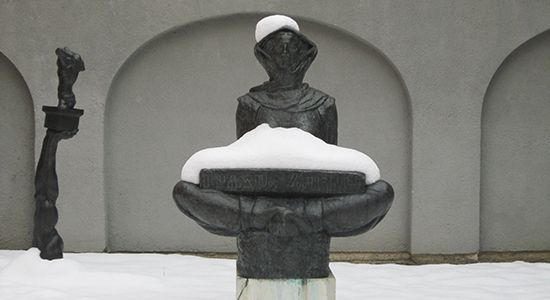Postwar memory generations
Contested memory, historical narratives and history education in Bosnia-Herzegovina and Serbia
This collaborative project investigates the role of history education and history schoolbooks in shaping cultural memory of the Yugoslav wars among youths in Bosnia-Herzegovina and Serbia.

The study of memory is interdisciplinary. This project brings together perspectives from cultural memory, historical narratives and social psychological memory studies in order to study Yugoslav war memory as cultural processes in the public and private sphere, as memory transmissions in schoolbooks and classrooms, and as individual and social responses to shared narratives. We aim to explore not only how war memory is transmitted through historical education, but also how it is received and made sense of by generations growing up in a post-conflict setting. In doing so, we seek to contribute to a deeper understanding of the role of history education in the development of young generations’ war memory in contemporary Bosnia and Serbia. More generally, we wish develop a set of interdisciplinary methodological tools for exploring the role of history education and memory narratives, something that is still missing within cultural memory studies and which will be of value to the study of memory also in other post-conflict societies.
History education and textbooks are considered vital tools for states to ingrain a certain collective memory and to socialise future citizens. Yet, we know little about the actual impact of history education. This is especially relevant in post-conflict regions with a painful past, such as Serbia and Bosnia-Herzegovina (BiH), where questions of what and how to remember are contested. Memory issues have implications for relations between countries, generations and groups in society. The project investigates how generations schooled in BiH and Serbia in the 2000s and 2010s remember the Yugoslav wars, by studying the role of history education, the ways in which youths encounter war memory and how memories influence young people’s perception of groups, their country and neighbouring countries.
Subproject 1: History textbooks, historical narratives and public memory
This subproject analyses and compares history schoolbooks used in both parts of BiH and in Serbia since the end of the Yugoslav wars. We pay particular attention to representations of the 1990s wars and to the construction of narrative logics in long-term historical narratives, asking how connections are created between past, present and future, how particular motives are repeated and how certain historical experiences are established, suggesting particular expectations for the future. Moreover, we investigate dominant narratives in public memory by studying political discourse and representations in museums, media debates and popular history writing.
Subproject 2: The social and psychological impact of history education
This subproject will ask questions of how individuals themselves understand and remember group histories and the consequences of historical narratives for individual understandings of self and nation and for orientations towards others in the present. Our research will draw on samples of high school students from Sarajevo (Federation of Bosnia-Herzegovina), Banja Luka (Republika Srpska) and Belgrade (Serbia). Through surveys and groups discussions we will assess knowledge, confidence in this and sources of historical knowledge and compare this with individual narratives.
Subproject 3: Teaching practices and informal memory transmissions in and around classrooms
This subproject consists of ethnographic fieldwork in high schools in Sarajevo, Banja Luka and Belgrade, studying how the 1990s wars are taught in practice, how teachers and students use textbooks and other sources and how this relate to other types of memory transmission. Socialization influences how narratives produced in textbooks are disseminated, interpreted and integrated by students. Through field research in classrooms, we can trace the circulation of textbook material and other narratives.
Researchers
| Name | Title | Phone | |
|---|---|---|---|
| Andersen, Tea Sindbæk | Associate Professor | +4521671923 | |
| Dedovic, Ismar | Postdoc | ||
| Morton, Thomas | Professor, Deputy Head of Department | +4535326356 |
Funding
VELUX humanities core group programme
Project period: 1 January 2023 - 31 December 2025
PI: Tea Sindbæk Andersen (PI), Thomas Morton (co-PI)

